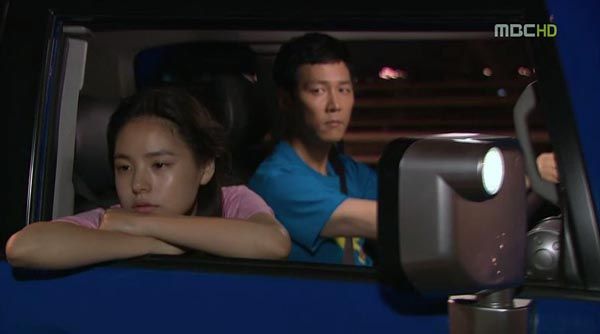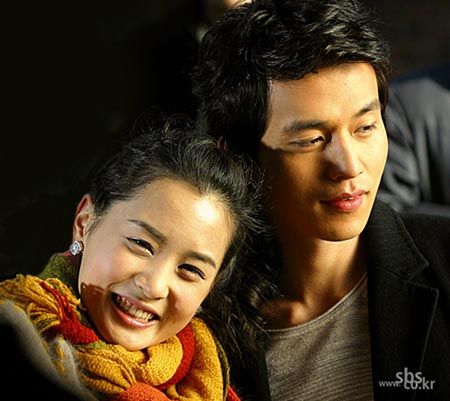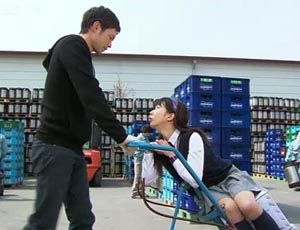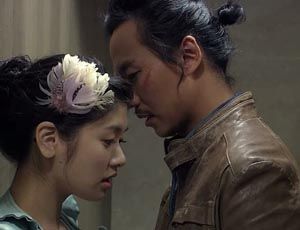Glossary: Oppa
by javabeans

Was there ever such heartbreaking confusion over the meaning of
the word “oppa” as with these two in Triple?
Perhaps you’ve seen that Glossary link in the menu to the left, languishing in neglect with nary an update. I decided, what better way to update than to expound upon those familiar kdrama terms and concepts in a Glossary Series? Because while longtime drama lovers may know exactly what a chaebol is, why pojangmachas rule, and why makjangs induce eye-rolls, sometimes we toss around these Korean terms freely without explanation. And we suspect (we being myself and girlfriday, of course!) that some people are left in confusion.
Hence: the Dramabeans (Extended) Glossary. First up in this ongoing series is that ubiquitous, loaded term that we see in practically every drama ever: “Oppa.”
Of all the terms in the glossary, oppa may be the most packed-with-extra-meaning-and-therefore-confusion entry. The straight definition is pretty simple — an oppa is what a girl calls her older brother, or an older guy whom she feels somewhat close to — but its application is where we get all tripped up in nuance.
The Types of “Oppa”
(1) The brother. This is the most straightforward use of oppa: the blood relative. This can mean a girl’s sibling or cousin, just as long as he’s male and older. Oddly enough, oppa can even mean one’s twin brother, if he were born ahead of the sister. In You’re Beautiful, Mi-nyeo calls her twin Mi-nam “oppa,” because ostensibly he got a few minutes’ head start in the world.
(2) The older guy. The term oppa can also be extended to guys who are not blood-related, but to whom the girl feels some closeness. When a girl is a young child, this is pretty easy to do — every boy older than you is an oppa.
When the girl starts growing older, however, she has a few more choices for things to call older guys and therefore the use of “oppa” becomes at her discretion. Now she gets to pick whether a guy is close enough to be an oppa — or maybe there’s some distance and sunbae, or his work title, or his name would be more appropriate.
A guy who takes on oppa status to a girl he’s not related to also takes on a few implied responsibilities, like generally watching over her and making sure she doesn’t get into trouble. He’s the one who might introduce her to social drinking — but he’s also the guy who’d better cut her off when she’s had too much. An oppa who takes advantage of his drunk charge isn’t worthy of the title oppa. If the currently popular trope of the cold-on-the-outside, fuzzy-on-the-inside hero can look to Mr. Darcy as its archetype, then the quintessential oppa is surely Mr. Knightley.

My Girl: Not quite an oppa
You might wonder, in My Girl, why does Yoo-rin call Gong-chan that weird formal word oraboni?
Oraboni is an older, formal version of oppa, most often heard in historical dramas. At first Yoo-rin calls Gong-chan by his title — executive director. However, once they assume the ruse that she is his long-lost cousin, she’s family and it’s no longer appropriate to use his business title. She can’t use his name because he’s older and that would be disrespectful. So why doesn’t she use oppa? Well, they’re virtual strangers, and oppa — even in family settings — suggests some level of closeness. And Gong-chan is a cold, distant sort of guy. To preserve that respect but to not appear presumptuous, she uses the more distant, formal oraboni.
Suffice to say that once you’re an adult, the lines get blurry. Add to that the following complication and here’s where things start getting tricky:
(3) The romantic oppa.
Hooo boy, now this is the big one.
A girl often calls her (older) boyfriend “oppa.” I know. It’s weird. It’s just how it is.
So you can imagine that the word now takes on all these added implications. No longer are you just the protective older brother-figure. Now the oppa is the object of romantic affection — the manly man, the stud. You take those earlier connotations of the brother-oppa (respect, guidance) and you add in romantic adulation? It’s a heady combination.
There’s a reason the denizens of the Open Thread have coined the term “Oppa Pout Wiggle,” or “O-P-W.” In short, it’s that whiny, girly, fussy way a girl pouts, “Oppaaaaaaaa” when she wants her boyfriend to do something for her. Personally, I find the oppa-whine immensely annoying, but there’s a reason the guy always crumbles. (Key example: Sung Yuri’s batty eyelashes and oppa-whine to Hyun Bin in Snow Queen. Also known as Samsooki’s kryptonite. There’s a particularly robust discussion about the O-P-W in Open Thread #81.)
Here’s an explanation in the words of Min-ae of 2006’s Soulmate:
The Application (and Complications) of “Oppa”
When a relationship is clear-cut, things are simple. But in kdrama-land, things are never clear-cut and one relationship always wants to be another kind of relationship. Hence all the blurry lines.
Take Triple. Haru (Min Hyo-rin) uses oppa with Hwal (Lee Jung-jae), her ex-stepbrother from childhood. They haven’t seen each other in years but when they reconnect, he’s still her oppa.
She also uses oppa with his buddy Hyun-tae (Yoon Kye-sang) — but why does she use “ajusshi” with a third friend Hae-yoon (Lee Seon-kyun), when they’re all the same age? (Ajusshi is used with older men.) Well, Hyun-tae is goofy, fun, and young at heart — oppa seems fitting. Hae-yoon is much more professional and acts like a real grown-up, so he gets the ajusshi treatment. Note that when Haru later switches to calling him oppa, he LOVES it. It makes him feel younger, plus it’s much cooler to be an oppa than a crotchety ol’ ajusshi.
There’s a scene in Triple (Episode 3) when the adorable Song Joong-ki, who has a crush on Haru, is miffed with her. She apologizes, calling him oppa, and immediately his attitude drops — he turns into a giddy, excitable boy. She doesn’t mean it flirtatiously, but it suggests that romantic vibe he so wants with her.
And then, another wrench is thrown into the works when Haru starts to develop feelings for Hwal — meaning that he starts to encompass all THREE meanings of oppa.


Two very different kinds of oppas: Cinderella’s Sister and Bad Guy
This romantic-platonic complication runs both ways. In the case of Song Joong-ki above, he wants that “oppa” usage to cross the divide from platonic into romantic. In an opposite scenario, a girl may desperately want to advance to the romantic stage with her oppa, but he sees her in a purely sisterly light. For instance, Cinderella’s Sister: Hyo-sun uses oppa readily with Ki-hoon, as she looks up to him and adores the ground he walks on. He merely thinks of her as a sister, but contrast that with Eun-jo. Could you imagine the reaction she’d get if Eun-jo ever tried to call Ki-hoon oppa? I’m guessing that would be the first and last time, since he’d be dead from shock.
In Coffee Prince, confusion about Eun-chan’s (Yoon Eun-hye) gender is exacerbated by her sister teasingly calling her oppa. Eun-chan already looks like a guy, so when her cute younger sister goes around calling her oppa (instead of the word for sister), it’s no surprise that Min-yup assumes that lady’s a dude.
In Que Sera Sera, Hye-rin calls Joon-hyuk oppa. They’re not related, but he was raised as her brother. As adults, the two have a secret affair, and you get the sense that Hye-rin relishes calling him oppa, which sounds like one meaning of the word but is spoken intending the other. (Also: WTF kdramas and your obsession with faux-incest?)
In the recent Bad Guy, 20-year-old Mo-nae has taken a liking to Gun-wook (Kim Nam-gil). Before she knows his name, there’s enough of a tangible age gap that she has to call him “ajusshi”… but after they bump into each other a few times and are on speaking terms, she asks for his name, and immediately switches to “Gun-wook oppa.” And now that she is dating him, she uses oppa freely.
Basically, the rule of thumb is: the closer you are, the more you can break the rules and the more you can use oppa.
In conclusion?
Oppa is a word with power. Don’t abuse it!
To cap things off, here’s the 2000 pop song “Oppa,” as sung by Wax and featuring a young Ha Ji-won. The song pretty much encapsulates the whole oppa dilemma:
I liked that simple, casual vibe
I just thought of you as a good person
But what’s up with this? I keep feeling you as a man
I must be in love with youOppa, only look at me.
Are you so busy?
It hurts my feelings
Why don’t you understand how I feel?
Oppa, why are you looking at her?
See, she’s bad
Look, take me now
Take me nowWhy won’t you see me as a woman?
Why do you keep saying it can’t work?
Look at other couples, they all start off as oppa
In the end they love and live happily
Next up: girlfriday defines noona.
Tags: Bad Guy, Cinderella's Sister, Coffee Prince, My Girl, Triple
![[2024 Year in Review] Bean of Squee](https://d263ao8qih4miy.cloudfront.net/wp-content/uploads/2023/11/beanofsquee.png)
![[K-Movie Night] A Year-End Medley](https://d263ao8qih4miy.cloudfront.net/wp-content/uploads/2024/12/YearEndMedley_1-scaled.jpg)

![[2024 Year in review] Actors bringing their A-game](https://d263ao8qih4miy.cloudfront.net/wp-content/uploads/2024/11/Jeongnyeon1112-00182.jpg)


![[2024 Year in Review] Beanie Awards](https://d263ao8qih4miy.cloudfront.net/wp-content/uploads/2024/12/beanieawards_2024.jpg)



Required fields are marked *
Your email address will not be published. Required fields are marked *
151 korean_panda_sarang
July 13, 2010 at 4:38 PM
Oppa is a very complicated word. You might also want to include how a fangirl refers to their boy idols. That's also pretty significant IMO. Just to let you know.
Required fields are marked *
152 Laeah
July 13, 2010 at 5:03 PM
@22 - My point is that a lot of fans will go around and start using "Oppa" thinking that it will somehow give them magic powers and somehow makes them special for knowing it and they will make asses out of themselves trying to use it... especially if they use it outside of Korea.
If you had to sit through hours and hours of classes trying to study a language seriously and trying to become fluent while 90% of the class only took the class because they fanboyz/girlz and kept saying "바보" or "오빠" or randomly going up to any Asian person assuming they were from a certain Asian country and start conversing you'd be a little annoyed with it too.
I have nothing against JB's description itself as it is a good one. I just hope that if you are going to start doing a language thing, to do more than just one word phrases that are basically not going to help anything. You can study the word Oppa all day long.. it's still not going to help you understand a drama any better past a certain point and it's not going to help you actually make a conversation with someone.
Required fields are marked *
153 jinjoo
August 1, 2010 at 6:43 PM
JB i just happen to be searching for Triple drama reviews & saw your take on Oppa..which btw i like how it sounds. When I went to Korea recently (I'm not from there) for a visit, we met this nice man who works at one of the famous Korean palaces in Seoul, so my sister & I started addressing him 'ahjussi' since having watched & been addicted to Kdramas for a while now have picked up some words etc. He was so nice to us & very welcoming so when we kept saying ahjussi, he was the one who initiated that we call him 'Oppa'!! I'm fully aware of the difference in calling someone oppa and i seem to have this associated with like a close friend or even a boyfriend so my sister & i smiled at each other & we did respect his request & along the way while he was showing us around the museum we started calling him Oppa!
If i may say so about the drama Triple which i just started watching a few days ago, I really am disappointed with this drama, I hope i'm not being a spoiler here as most of you must've seen this, but I just didn't like the way the story turns around with this young skater falling for her stepbrod esp. with the big age difference! This reminds me of One Fine Day but at least in the latter drama, Song yu ri's age isn't that much gap with Go soo, it would be more appropriate if the skater fell for Yoon kye sung's age since YKS looks so young. I'm not sure now if I shld waste my time & just stop watching it! :))) One of the reasons I started watching it is because of the lead actors but it's not really their fault, the storyline just didn't play well with me.
Required fields are marked *
154 iheartgongyoo
October 3, 2010 at 1:32 AM
very informative. so clear and precise... good work!
Required fields are marked *
155 Lady GiGi
December 21, 2010 at 4:48 AM
but the men were called "unni" in Chuno!
Required fields are marked *
156 bathala
January 3, 2011 at 10:04 PM
For the longest time, me and the wife been wondering why the actual word coming from the girl characters are "oppa" but in the sub ... its the male character name. It was weird at first and them my wife suggested that it must be a term of endearment very similar to "kuya" in filipino/tagalog. The only main difference is that "kuya" is never used as a 3rd type since it would be technically implying incest. Still, a girl can use "kuya" to someone she loves until the guy confesses or acknowledge the girl's feeling ... until then, the word is acceptable. Oh last note, unlike in korean, "kuya" can be used by both gender of any age. A male can use the O-P-W form of "kuya" under two circumstances; (1) the boy has not yet reached puberty and (2) the boy is gay.
So a quick and dirty language comparison:
Korean - Filipino
ahjussi - mama (we don't pronounce this the same as the American endearment for your mom, its just spelled the same)
oppa - kuya
Oh, a little tidbit. You can actually use "kuya" if you do not know the name of an older person your speaking to. An example is that your in the Philippines and your lost and want to ask direction. Instead of saying "Excuse me, i'm lost, can you help me?" its more polite to say "Kuya, i'm lost, can you help me?" and may get a better response.
Required fields are marked *
157 jopi
March 2, 2011 at 12:53 PM
In We Got Married' variety/reality show, I found it weird that after months of being together, seohyun started using the word "'Oppa" to address Yonghwa instead of ''Yong"' (the nickname they initially agreed upon)..... So, i hope ur thinking what i'm thinking... :) this just defines how much closer they are now... I hope she meant the romantic oppa type... : )
Required fields are marked *
158 zazuki
April 28, 2011 at 5:06 AM
imo, faux-incest is used to make it such that the main couple cannot be together or like a love that cannot be. i guess that it makes the romantic part of the drama more interesting and girls are suckers for such storylines. haha and im one of them:D
Required fields are marked *
159 JayZ
July 17, 2011 at 7:18 PM
Haha I hadn't planned on watching soulmate but after watching that clip I am thoroughly too tempted to just drop all and begin watching the complete drama. Oh dramabeans whatever will I do T^T I can't live without you (because you negate the need to spend an extra 16hrs of my life furthering my addiction) but I can't live with you either~ Q_Q
Je vous adorez mes cheries<3 merci beaucoup
Required fields are marked *
160 Noona
August 4, 2011 at 12:28 PM
My boyfriend is Korean and I call him Oppa, but I'm older than him, so he calls me Noona because I'm older and I call him Oppa to make him feel better! XPP
Required fields are marked *
161 Cattate
September 26, 2011 at 7:21 PM
I'm so happy you're breaking down these terms. I just got into dramas and I thought I has a good understooding of Oppa but there was so much more to it after reading this. It sucks that we don't have those differences available in english. I wish we did though so relationships wouldn't be so dang confusing.
Required fields are marked *
162 Guaria
October 2, 2011 at 6:16 PM
In Protestant churches people often refer to each other as brother and sister (Brother Jones and Sister Brown, for example). How do Koreans refer to their fellow church members?
Required fields are marked *
163 Marga
January 12, 2012 at 3:52 PM
Isn't oppa similar to "niisan" in japanese then? I understand a little bit of japanese but I'm new to korean so I don't know if it's used the same way, but reading this entry I think they're similar.
Required fields are marked *
164 Lauren
June 15, 2012 at 7:08 PM
Thanks for posting this! Can't wait for more words.
Required fields are marked *
165 nyuu
October 24, 2012 at 12:55 PM
oraboni >> shouldn't that be orabonim?
Required fields are marked *
166 kowaikawaiichibi
March 19, 2013 at 1:40 AM
So what's a noona to call her younger boyfriend?
Required fields are marked *
aa
January 8, 2015 at 12:09 PM
there is no such word.
younger girl -> boy : oppa
younger girl -> girl : unni
younger boy -> boy : hyung
younger boy -> girl : nuna
older boy -> girl, boy and older girl->girl, boy : noun
just uses dongsaeng or banmal
Required fields are marked *
167 Just call me Oppa – 오빠라고 그래… (Honorific System in South Korea) | Kimchi Sarma - My Korean Oppa
September 3, 2014 at 5:52 AM
[…] though, I would suggest that you read Dramabean’s or Seoulistic’s detailed posts on this […]
Required fields are marked *
168 Yo!
January 3, 2016 at 11:58 AM
Thanks for explanation, from all the dramas I'd seen I got the feeling that "oppa" was a loaded title, this post helped to lessen the vagueness :)
I have a question about another thing that seems to be cultural or has specific meaning in K-dramas - a kiss. It seems like if a boy kisses a girl he somehow gets some king of a status with her or something, somehow "claims" her. For example, in Secret Garden episode 11 (around the middle) when Ra-im confronts Joo-won about what he had said to Jong-soo (to not ever confess his feelings), Joo-won "plants a declarative kiss on her lips" and "tells her that he’s “earned the right” now".
I've seen similar scenes in other dramas and wonder is this a thing in real life or dramas? does a kiss is such a big deal with loaded meaning?
Required fields are marked *
169 Oppas and the art of avoiding pronouns | koreanstudentblog
April 2, 2016 at 12:53 PM
[…] what the whole fuss is about, and want a more thorough explanation, Dramabeans has published an informative post about the different types of 오빠s and why they can be so confusing. In short, though, it is a […]
Required fields are marked *
170 Elaicka
October 1, 2016 at 11:46 PM
Hello, The first picture. I want to know the name of the drama please thanks!
Required fields are marked *
Elaicka
October 1, 2016 at 11:54 PM
I'm sorry I just noticed the note below the picture. :D
Required fields are marked *